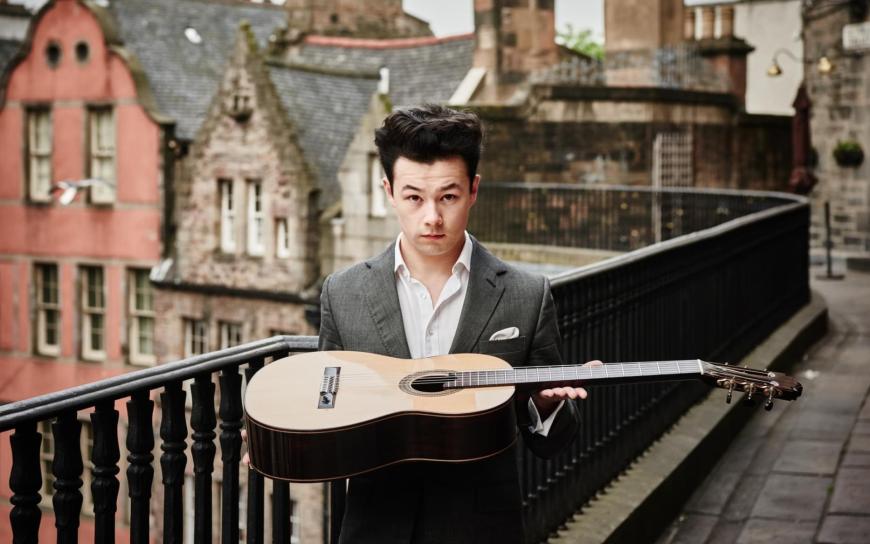
Guitarist Sean Shibe, born in Scotland to English and Japanese parents, is increasingly sought after for his wide-ranging taste, creative spirit, and polished performances on both classical and electric guitar. His concert with the internationally acclaimed Van Kuijk Quartet in Herbst Theatre on Friday night demonstrated the expressive power of their collaboration.
The evening, presented by the Omni Foundation and San Francisco Performances, began with an incendiary account of Felix Mendelssohn’s String Quartet No. 6 in F Minor, Op. 80. Mendelssohn composed the piece after the death during childbirth of his beloved sister Fanny and created a work of intense anguish. The Van Kuijk’s performance fully captured both the power of passionate grief and the rapidly fading consolations of fond memory.
Luigi Boccherini’s Guitar Quintet No. 4 (“Fandango”) was an odd choice for a program featuring a guitar soloist. The work is a transcription of movements from previously written string quintets, made for the use of a patron who was also an amateur guitarist, and the guitarist’s role is minor. There are a few small solo passages and added exotic color of Spanish music in the final movement, which gives the piece its nickname. The cellist’s added percussion on the body of his instrument was not as effective as the customary castanets, and the inadequate amplification made one wonder why the guitarist was onstage.

Shibe demonstrated his musical and intellectual mastery in a fascinating group of three profound miniature that were subtly related. Thomas Adès’s Habanera derives from his most recent opera, The Exterminating Angel. Based on a classic surrealist film by Luis Buñuel, which tells the story of a group of wealthy guests who find themselves unable to leave after a lavish dinner party and the absurd violence that ensues, the opera includes an aria for mezzo-soprano, guitar, and ondes Martenot, reacting to a disembodied hand. Adès and Shibe adapted the music to create a solo guitar piece which Shibe has characterized as vividly grotesque.
The habanera rhythm provides the underlying pulse for both Adès’s piece and Manuel de Falla’s “Homenaje” (from Le Tombeau de Claude Debussy). Falla associated with and was influenced by Debussy and later became fascinated by traditional Andalusian flamenco. After Debussy died, the journal La Revue musicale commissioned music written in his honor by Falla, Béla Bartók, Maurice Ravel, Albert Roussel, Erik Satie, and Igor Stravinsky. Falla’s composition, though short, is widely considered one of the masterpieces of the guitar repertoire. A profoundly melancholic work, it concludes with a poignant quotation of Debussy’s La soirée dans Grenade. It is Falla’s only work written for guitar and was subsequently arranged by the composer for piano and for orchestra.
Shibe also played the Sarabande for guitar by French composer Francis Poulenc. It is another work connected to an opera: In this case, Poulenc alludes to a melody he used in the last act of Dialogues of the Carmelites. Though a sarabande is usually a slow dance in triple meter, Poulenc changed from the time signature from 3/4 to 5/4 and 4/4, creating a sense of ambiguity also emphasized by the score’s tempo marking, “Molto calmo e melanconico.”
In his set of three miniatures, Shibe took us on a journey from the grotesque through melancholy to an ambiguous calm and performed these three profound pieces with an introspection so powerful it left the audience in rapt silence after the final notes.
Mario Castelnuovo-Tedesco’s Guitar Quintet, Op. 143, fulfilled the promise of the concert’s combination of guitar and string quartet. The writing for each instrument was felicitous, and the amplification issues were apparently solved at intermission. The composer wrote of the quintet, “It is a melodious and serene work, partly neoclassic and partly neoromantic (like most of my works). I would say, it is written almost in a Schubertian vein.” The playing by both Shibe and the Van Kuijk was glorious.



